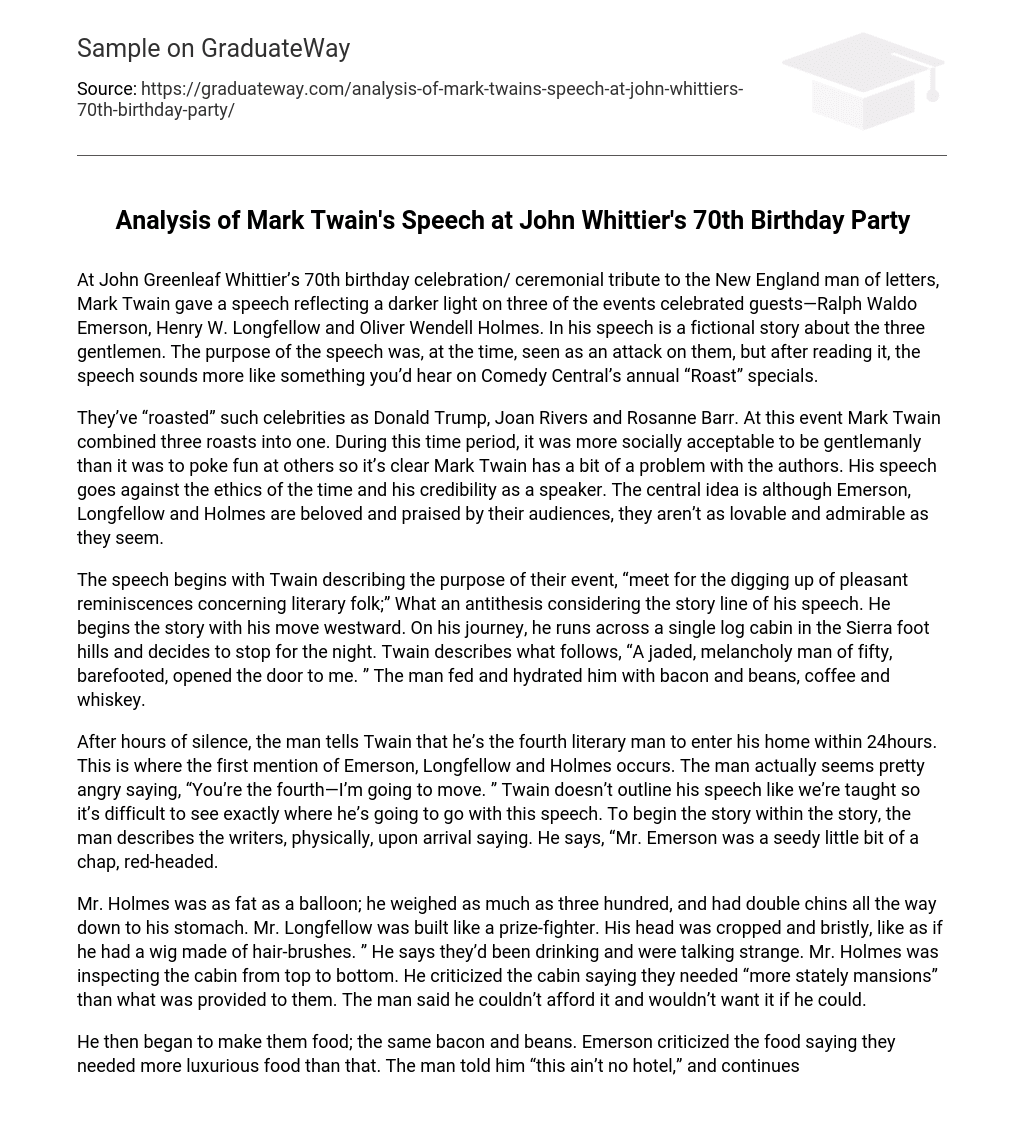At John Greenleaf Whittier’s 70th birthday celebration/ ceremonial tribute to the New England man of letters, Mark Twain gave a speech reflecting a darker light on three of the events celebrated guests—Ralph Waldo Emerson, Henry W. Longfellow and Oliver Wendell Holmes. In his speech is a fictional story about the three gentlemen. The purpose of the speech was, at the time, seen as an attack on them, but after reading it, the speech sounds more like something you’d hear on Comedy Central’s annual “Roast” specials.
They’ve “roasted” such celebrities as Donald Trump, Joan Rivers and Rosanne Barr. At this event Mark Twain combined three roasts into one. During this time period, it was more socially acceptable to be gentlemanly than it was to poke fun at others so it’s clear Mark Twain has a bit of a problem with the authors. His speech goes against the ethics of the time and his credibility as a speaker. The central idea is although Emerson, Longfellow and Holmes are beloved and praised by their audiences, they aren’t as lovable and admirable as they seem.
The speech begins with Twain describing the purpose of their event, “meet for the digging up of pleasant reminiscences concerning literary folk;” What an antithesis considering the story line of his speech. He begins the story with his move westward. On his journey, he runs across a single log cabin in the Sierra foot hills and decides to stop for the night. Twain describes what follows, “A jaded, melancholy man of fifty, barefooted, opened the door to me. ” The man fed and hydrated him with bacon and beans, coffee and whiskey.
After hours of silence, the man tells Twain that he’s the fourth literary man to enter his home within 24hours. This is where the first mention of Emerson, Longfellow and Holmes occurs. The man actually seems pretty angry saying, “You’re the fourth—I’m going to move. ” Twain doesn’t outline his speech like we’re taught so it’s difficult to see exactly where he’s going to go with this speech. To begin the story within the story, the man describes the writers, physically, upon arrival saying. He says, “Mr. Emerson was a seedy little bit of a chap, red-headed.
Mr. Holmes was as fat as a balloon; he weighed as much as three hundred, and had double chins all the way down to his stomach. Mr. Longfellow was built like a prize-fighter. His head was cropped and bristly, like as if he had a wig made of hair-brushes. ” He says they’d been drinking and were talking strange. Mr. Holmes was inspecting the cabin from top to bottom. He criticized the cabin saying they needed “more stately mansions” than what was provided to them. The man said he couldn’t afford it and wouldn’t want it if he could.
He then began to make them food; the same bacon and beans. Emerson criticized the food saying they needed more luxurious food than that. The man told him “this ain’t no hotel,” and continues his cooking. He is yet again interrupted by Longfellow’s preaching of the honor of the first born son. The man quickly shut him up and finished his cooking. It’s obvious in his speaking; the man in the story was a user of slang terms. Twain used As he did for Twain, he took out the whiskey, and yet again Emerson complained of the classlessness of the drink.
He told them if they didn’t eat what he had laid out, they wouldn’t eat. He says after dinner they began to play cards. He describes Emerson as a sneaky and tricky card player. The game termed violent this Emerson grabbing his bow, Longfellow pulling his revolver and Holmes threatening to flatten them both. Immediately after the little show, they praised themselves for their works and made the man sing to them until he couldn’t sing anymore. Upon waking, the man saw Longfellow stealing his only boots with his own boots under his arm.
Twain reacts to the story saying, “Why, my dear sir, these were not the gracious singers to whom we and the world pay loving reverence and homage: these were impostors. ” I think a bit of irony reigns in that statement considering he spent the story bashing them. He concludes his speech saying, “In my enthusiasm I may have exaggerated the details a little, but you will easily forgive me that fault, since I believe it is the first time I have ever deflected from perpendicular fact on an occasion like this. I’m honestly surprised no one tried stopping the speech when he first said anything negative about the writers. Twain moved to Europe months after the criticism of the speech was released. He was burned by it for years after. He received the first positive feedback in 1888 and realized it wasn’t as big of a deal as he thought.
Works Cited
Safire, William. “Mark Twain. ” Lend Me Your Ears: Great Speeches in History. New York: Norton, 1992. 598-605. Print





